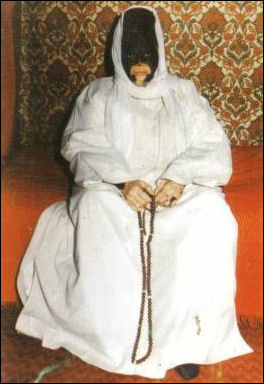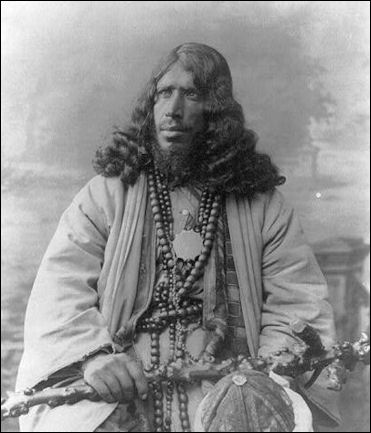Home | Category: Muslim Groups / Sufis
SUFISM

Serignebi Sufism, or Tasawwuf as it is known in the Muslim world, is a mystical form of Sunni Islam whose members pursue a spiritual experience using bodily discipline and mystical intuition. It also incorporates ecstatic experiences and the veneration of Muslims "pirs,"or saints.
Non-Muslims often mistake Sufism as a sect of Islam. Sufism is less a sect than a movement, or a way of approaching Islam. Sufism is more accurately described as an aspect or dimension of Islam. Both Sunnis and Shias can be Sufis. Sufi orders (Tariqas) can be found in Sunni, Shia and other Islamic groups.The word Sufi comes from the Arabic word for wool because early followers wore robes of coarse white wool. In medieval times Sufis were also known as dervishes (their Persian name) and fakirs, both of which mean “poor brother.”
Sufis seek a close personal experience with God and believe they have acquired a special mystical knowledge directly from Allah. Many Sufis define their belief as a “religiosity” rather than a religion because it revolves around personal experience rather than doctrine and involves contemplation, awareness and a quest for purity. The mysticism of Sufism is justified by passages from the Qur’an that describe the nearness of God and the way that people can respond and on the mysterious night journey Muhammad made after his death to Jerusalem and Paradise.
Sufism was never a unified movement. Rather it existed in the form of separate schools that had their own teachers, techniques, philosophies and beliefs. Teachers, often known as Shaiks or Pirs, passed their methods down to disciples. Schools and sects, that often became centered around the tomb of the school’s founder, were formed. They generally were not associated with with any legal school of ore other theological group.
According to the BBC: “Although Sufis are relatively few in number they have shaped Islamic thought and history. Through the centuries Sufis contributed hugely to Islamic literature for example Rumi, Omar Khayyám and Al-Ghazali's influence extended beyond Muslim lands to be quoted by Western philosophers, writers and theologians. Sufis were influential in spreading Islam particularly to the furthest outposts of the Muslim world in Africa, India and the Far East.” [Source: BBC, September 8, 2009 |::|]
Conservative governments and Muslim extremist often oppose Sufism and regard Sufis as heretics. Even so Sufi adepts are often more extreme in their views and their intolerance towards non-Muslims that typical Sunni Muslims.
Websites on Sufis Divisions in Islam archive.org ; Sufism in the Oxford Encyclopedia of the Islamic World williamcchittick.com ; Sufism, Sufis, and Sufi Orders – Sufism's Many Paths islam.uga.edu/Sufism ; The Threshold Society sufism.org ; Mysticism in Arabic and Islamic Philosophy, Stanford Encyclopedia of Philosophy plato.stanford.edu ; Risala Roohi Sharif, translations (English and Urdu) of "The Book of Soul", by Hazrat Sultan Bahu, a 17th century Sufi risala-roohi.tripod.com; Sufism - an Inquiry sufismjournal.org
RECOMMENDED BOOKS:
“Essential Sufism” by James Fadiman, Huston Smith, et al. Amazon.com ;
“The Garden of Truth: The Vision and Promise of Sufism, Islam's Mystical Tradition” by Seyyed Hossein Nasr Amazon.com ;
“Living Presence (Revised): The Sufi Path to Mindfulness and the Essential Self”
by Kabir Edmund Helminski, Iman Amazon.com ;
“The Principles of Sufism” by ʿAʾishah al-Bauniyyah Amazon.com ;
“Women of Sufism: A Hidden Treasure” by Camille Adams Helminski Amazon.com ;
“Al-Ghazali's Path to Sufism: His Deliverance from Error” by Abu Hamid Muhammad al-Ghazali (Author) Amazon.com ;
“Hidden Caliphate: Sufi Saints beyond the Oxus and Indus” by Waleed Ziad Amazon.com ;
“Winds of Grace: Poetry, Stories and Teachings of Sufi Mystics and Saints”
by Vraje Abramian Amazon.com ;
“The Mysticism of Sound and Music: The Sufi Teaching of Hazrat Inayat Khan Amazon.com ;
“Sufi Music of India and Pakistan: Sound, Context, and Meaning” by Regula Burckhardt Qureshi Amazon.com
Defining Sufism

Sufi mystics and attendants
The great 14th century Muslim scholar and historian Ibn Khaldun described Sufism as: “dedication to worship, total dedication to Allah most High, disregard for the finery and ornament of the world, abstinence from the pleasure, wealth, and prestige sought by most men, and retiring from others to worship alone.” [Source: Ibn Khaldun, quoted in Keller, Nuh Ha Mim, The Place of Tasawwuf in Traditional Islam, www.masud.co.uk, 1995]
Arthur Goldschmidt, Jr. Wrote in “A Concise History of the Middle East”: Sufism is a difficult subject to discuss. Any effort to define it is apt to mislead you. My attempt to do so is rather like calling the oyster "a sea creature with a grey shell." While many Muslims whom I know scorn Sufism as a nonrational perversion of Islam, others make it the essence of their faith. Many Sufis regard their beliefs and practices as universal, existing in every religion, no more (or less) Islamic than they are Christian, Buddhist, or Zoroastrian. Each religion, they say, contains the germ of ultimate truth; but, when controlled by an unsympathetic and worldly hierarchy, it can degenerate into a meaningless cult. Sufism seeks to rediscover meaning that is veiled from our sense and impenetrable to human reason. In monotheistic religions like Islam, finding ultimate truth is called communion with God. This can be done by meditation or by esoteric rites, such as prolonged fasting, night vigils, controlled breathing, repetition of words, or whirling for hours on one spot.”
Nicholas Schmidle wrote in Smithsonian Magazine: “Sufism is not a sect, like Shiism or Sunnism, but rather the mystical side of Islam—a personal, experiential approach to Allah, which contrasts with the prescriptive, doctrinal approach of fundamentalists like the Taliban. It exists throughout the Muslim world (perhaps most visibly in Turkey, where whirling dervishes represent a strain of Sufism), and its millions of followers generally embrace Islam as a religious experience, not a social or political one. Sufis represent the strongest indigenous force against Islamic fundamentalism. Yet Western countries have tended to underestimate their importance even as the West has spent, since 2001, millions of dollars on interfaith dialogues, public diplomacy campaigns and other initiatives to counter extremism. Sufis are particularly significant in Pakistan, where Taliban-inspired gangs threaten the prevailing social, political and religious order. [Source: Nicholas Schmidle, Smithsonian Magazine, December 2008 |+|]
History of Sufism
Sufism emerged during Islam's early years, when Islam was expanding into places like India, where mysticism was very much alive. Early Sufis believed that Islam placed too much emphasis on worldly concerns, rituals, and legalities. They wanted a form of religion that led to inner ecstasy [Source: Encyclopedia.com].
From the earliest days of Islam, some Muslims have been attracted to mystical interpretations of their religion. The term Sufi derives from the Arabic suf , which means wool. Early Muslims used the term Sufi to refer to fellow believers who wore simple woolen garments to demonstrate their rejection of materialism and worldly temptations and their devotion to a life of asceticism and prayer. Eventually, some Sufis who had acquired reputations for their learning and piety attracted disciples who aspired to learn from and emulate these Sufi masters. Initially, Sufi followers were like students whose bonds to a Sufi teacher were based on personal loyalty. Since the twelfth century, however, most Sufis have organized themselves into orders or brotherhoods that follow the teachings of a particular Sufi master. [Source: Library of Congress, January 1995 *]

Syariah-thariqah-hakikah "From the eleventh to the nineteenth century, Sufism dominated the spiritual life of most Muslims. Brotherhoods of mystic dervishes, also called Sufi orders, grew up throughout the ummah, providing a new basis for social cohesion. The Safavid dynasty, which ruled Iran between 1501 and 1736, began as a Sufi order. Sufism also held together the warrior ghazis who founded its better-known rival, the Ottoman Empire. The Safavids were Shi'is and the Ottomans Sunnis, which goes to show that both of the main branches of Islam could accommodate Sufism. /~\
As Sufism became increasingly popular and widespread it triggered back-to-basics movements among Muslim groups such as Wahhabis that opposed Sufism, arguing it was a superstition and insisting that Muslim return to basic doctrines of the early Islamic era. In the 18th and 19th century Sufis were persecuted and driven underground.
See Separate Article: HISTORY OF SUFISM: ORIGIN, AL-GHAZALI, SECTS, SOUTH ASIA africame.factsanddetails.com
Sufi Beliefs
The primary beliefs of Sufis are: 1) Devoted Muslims can experience God only through consistent chanting, meditation, love for other people, self-discipline, and self-denial. 2) The way to achieve spiritual wealth is through frugality.. Excessive worldly possessions can corrupt the soul. Sufis are well known for their charitable work. 3) Patience is a virtue. Sufis pin their faith and existence on God's knowledge of the future, and thankfulness to God. [Source: Encyclopedia.com]
Rather than focusing on the numerous rules and regulations enumerated by the Qur’an, Sufism picks out poetic and mystic verses such as “Wherever you turn, there is the face of God—“which also abounds” — and mines them for meaning. Sufis have mapped out a mystical theology that aims to seek out soul of God and have given Islam some unique spins. The Qur’an scripture about God being “closer to man than his own neck vein” becomes “I am near to answer the call of the caller when he calls to me.”
The tradition of Islamic mysticism known as Sufism appeared very early in Islam and became essentially a popular movement emphasizing love of God rather than fear of God. Sufism stresses a direct, unstructured, personal devotion to God in place of the ritualistic, outward observance of the faith. An important belief in the Sufi tradition is that the average believer may use spiritual guides in his pursuit of the truth. These guides — friends of God or saints — are commonly called fakirs or pirs. [Source: Library of Congress]
Sufi Mystical Beliefs
Sufis seek the truth of divine love and knowledge through direct personal experience with God. They attempt to reach a state of “ fana” (a temporary ecstatic intoxication of divine love) and “ baqa” (a prolonged condition of complete "human in-dwelling with God”). Some Sufis viewed the high of spiritual consciousness as the “Light of Lights” and described the process of reaching it as “ascending degrees of illumination.”
Unlike mainstream Muslims, who regard the soul as a material substance connected to the body, Sufis regard the soul as something more abstract and separate from the body and connected to God, a notion that many Muslim consider blasphemous. For Sufis, Muhammad’s ascension to heaven is regarded as model for the flight of the human soul to God.
Sufis have worked out their own schemata of the universe. They have been heavily influenced by the 13th century Persian sage Rumi who argued that earth, water, air and fire are the basic elements and we are worth no more that whatever we fear and a seeker of knowledge goes through many phases.
According to the Encyclopedia of World Religions Sufis believe that: “the human spirit being a direct emanation from the divine Command, is therefore an emanation of God himself, and could find its highest aim only in the obliteration of its illusory selfhood and absorption into the Eternal Reality. The supreme mystical experience is thus achieved in union with God, even if only momentarily.”
Sufi Brotherhoods

Since the twelfth century, however, most Sufis have organized themselves into orders or brotherhoods (tarikat ; pl., tarikatlar) that follow the teachings of a particular Sufi master. Many Sufi tarikatlar established institutional bases, called tekke or dergah (lodges), that lasted for several generations and, in some instances, even for centuries. For example, two of contemporary Turkey's largest tarikatlar , the Naksibendi and the Kadiri, date back at least to the fourteenth century. Some tarikatlar carry the name of the founding Sufi master, the seyh (in Arabic, shaykh). [Source: Library of Congress, January 1995 *]
One example is the Mevlevi brotherhood. Its members popularly are called whirling dervishes because of the rhythmic whirling they engage in as a spiritual exercise and a means to achieve ecstatic proximity to God. The brotherhood is named after its founder, Mevlana (Jalal ad Din Rumi, d. 1273). Ordinarily, a designated successor to the seyh inherited his position of leadership as well as the mantle of his spiritual power. Induction into a particular tarikat became regulated and usually depended on the performance of prescribed initiation procedures. Initiates were placed at different levels, depending on the instruction they had mastered. Some of the larger Sufi tarikatlar established branches and through evkaf accumulated land and buildings, which functioned as tekkes , Qur’an schools, residential monasteries, orphanages, and hospices.*
The early tarikatlar were strongly influenced by Shia doctrines. Consequently, the political conflicts between the Sunni Ottoman and Shia Safavi dynasties affected the Sufi orders in Turkey. Sunni tarikatlar eventually deemphasized such practices as the veneration of Ali ibn Abu Talib and received official patronage from some Ottoman sultans. However, at least one Shia tarikat , the Bektasi, supported the Ottomans and actually exercised significant political influence without changing their heterodox beliefs. The Bektasi and the Sunni tarikatlar also served an important social function by providing educational and social welfare services, constituting a means of social mobility, and offering spiritual guidance to the people, especially in rural areas.*
Sufi Masters, Holy Men and Structure
Many Sufi orders are organized around masters known in different sects as “pir” , “sheik” , “ishan” , “murshid” or “ustad” . Revered as teachers with divine connections to God, they provide guidance and spiritual help for followers and are a source of inspiration. According to an old Sufi saying: “he who has no sheik, the Devil is his sheik.” Many masters and teachers trace their lineage back to pioneering teachers by way “chains” of spiritual affiliations, which in turn are often linked to Companions of Muhammad, often Ali.

Sudan dervish in the 1920s Followers pass through different stages in their spiritual journey. Sufi initiates are given a skullcap and black cloak. In the early stages of their quest they were not unlike newly saved Christians, who announced they would repent and promised to turn away from their sinful past. The journey often involved a progression from the body to energy to spirit and a return to the world that was not unlike the path taken by Buddha.
Some Sufis are wandering dervishes who carry a wooden cane and have hair tinted with henna. They travel from place to place and try to spread the word of their religion but are elusive when talking about themselves. If you ask where a Sufi ascetic where he is going, comes from or how he earns his money he will say "Only Allah knows." Some are hermits who live in caves like Buddhist or Hindu holy men. One Sufi master spent 50 years in the jungles of Sri Lanka observing animals and learning about God.
The structure of Sufism is more hierarchal than orthodox Islam, which stresses the equality of all believers. Sufism was something that was learned. Initiates pass through different levels to became masters, with each higher level having corresponding higher status. In the past masters developed large following and became quite famous. They received large amounts of money as gifts, built large buildings and were honored with large shrines and treated as saints after they died. Muhammad discouraged this kind of adoration.
Sufism is a relatively laid back when it comes to rules and structure. On some levels Sufis reject religious hierarchy and stress direct human contact with the infinite. Sufi sects are often decentralized and secretive. They often flout some of the rules of Sharia which puts them in a bad light in the eyes of conservative Muslims. There are some Sufi sects that aim to operate within the confines of the Qur’an and stay close to orthodox Islam.
Tariqas (Sufi Teachers)
Sufi Muslims not only follow the rules of the Qurʾan and the hadiths they also follow the dictates of Sufi masters, often contained in stories and songs. According to the BBC: “Sufis are emphatic that Islamic knowledge should be learned from teachers and not exclusively from books. Tariqas can trace their teachers back through the generations to the Prophet himself. Modelling themselves on their teachers, students hope that they too will glean something of the Prophetic character. [Source: BBC, September 8, 2009 |::|]
“In pursuit of this goal of worshipping Allah, Sufis belong to Tariqas, or orders, established in the first few centuries after the Prophet's death. These orders have a master who will teach sacred knowledge to others in the group. Although Tariqas have a long history, in recent times some Muslims have questioned the necessity of Tariqas arguing that they were alien to the Prophet himself. Sufis make a convincing defence from the Qur'an and Sunna (what the Prophet said, did, agreed to or condemned). |::|
Some of the world's best-selling poets have been Sufis. The poetry of Rumi (Mevlana, Jalal ad-Din ar-Rumi 1207–1273) continues to be read by Muslims and non-Muslims alike for its ecstatic, or blissful, vision of a loving God. Some Sufis, known as Whirling Dervishes, follow the teachings of Rumi by spinning rhythmically and chanting the ninety-nine names of God.[Source: Encyclopedia.com]
Links Between Sufi Teachers and Muhammad
According to the BBC: Sufis acknowledge that Tariqas were not established at the time of the Prophet. They consider that the Prophet his companions and their immediate successors, the first three generations, embodied Islamic mysticism but the phenomenon was too general to have a specific name. Later generations of Muslims became distracted by worldliness and so those, now in the minority, that were dedicated to worshipping Allah were given the name Sufi. This turn of events was eloquently described in the 10th Century by Abu l-Hasan Fushanji who said; Today Sufism is a name without a reality. It was once a reality without a name. [Source: Abu l-Hasan Fushanji, quoted in Lings, Martin, What is Sufism?, The Islamic Texts Society, 1999, pg 45 |::|
“Although the word Sufism is absent from prophetic speech, it's believed Sufism's place in Islam is described by the Prophet. Umar ibn al-Khattab, a companion of the prophet, said; "One day we were sitting in the company of Allah's Apostle (peace be upon him) when there appeared before us a man dressed in pure white clothes, his hair extraordinarily black. There were no signs of travel on him. None amongst us recognized him. At last he sat with the Apostle (peace be upon him). He knelt before him placed his palms on his thighs and said: Muhammad, inform me about Islam. "The Messenger of Allah (peace be upon him) said: Islam implies that you testify that there is no god but Allah and that Muhammad is the messenger of Allah, and you establish prayer, pay Zakat, observe the fast of Ramadan, and perform pilgrimage to the (House) if you are solvent enough (to bear the expense of) the journey. He (the inquirer) said: You have told the truth. [Source: Sahih Muslim, Book 1:Number 1]

Tharundas Baul
"It amazed us that he would put the question and then he would himself verify the truth. "He (the inquirer) said: Inform me about Iman. "He (the Holy Prophet) replied: That you affirm your faith in Allah, in His angels, in His Books, in His Apostles, in the Day of Judgment, and you affirm your faith in the Divine Decree about good and evil. "He (the inquirer) said: You have told the truth. He again said: Inform me about Ihsan. "He (the Holy Prophet) said: That you worship Allah as if you are seeing Him, for though you don't see Him, He, verily, sees you. "He (the enquirer) again said: Inform me about the hour (of the Doom). "He (the Holy Prophet) remarked: One who is asked knows no more than the one who is inquiring (about it). ) "He (the inquirer) said: Tell me some of its indications. "He (the Holy Prophet) said: That the slave-girl will give birth to her mistress and master, that you will find barefooted, destitute goat-herds vying with one another in the construction of magnificent buildings. ) "Then he (the inquirer) went on his way but I stayed with him (the Holy Prophet) for a long while. He then, said to me: Umar, do you know who this inquirer was? I replied: Allah and His Apostle knows best. He (the Holy Prophet) remarked: He was Gabriel (the angel). He came to you in order to instruct you in matters of religion."
“In this well-known hadith the angel Gabriel asks about pivotal features of the Islamic belief. They included Islam, Iman, and Ihsan. Islam is the outward practice of the religion. Iman is the belief in the unseen and what the prophets have informed us of. Ihsan is to worship Allah as though one sees him. Traditionally scholars were able to teach each of these essential parts of Islam. The Imams of Sharia or 'sacred law' taught at the level of Islam. The Imams of Aqida or 'tenets of faith' taught Iman. The Imams of Sufism taught at the level of Ihsan. |::|
“The need to learn from a teacher is based on the Quranic verses; “Ask those who know if you know not” — Qur'an 16:43. “And follow the path of him who turns unto Me” — Qur'an 31:15
Image Sources: Wikimedia Commons
Text Sources: Internet Islamic History Sourcebook: sourcebooks.fordham.edu ; Arab News, Jeddah; “Islam, a Short History” by Karen Armstrong; “A History of the Arab Peoples” by Albert Hourani (Faber and Faber, 1991); “World Religions” edited by Geoffrey Parrinder (Facts on File Publications, New York); “Encyclopedia of the World’s Religions” edited by R.C. Zaehner (Barnes & Noble Books, 1959); Metropolitan Museum of Art, Encyclopedia.com, National Geographic, BBC, New York Times, Washington Post, Los Angeles Times, Smithsonian magazine, The Guardian, Al Jazeera, The New Yorker, Time, Newsweek, Reuters, Associated Press, AFP, Library of Congress and various books and other publications.
Last updated April 2024
